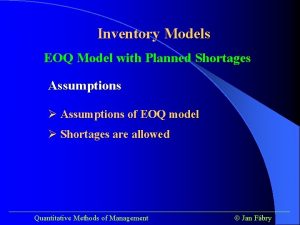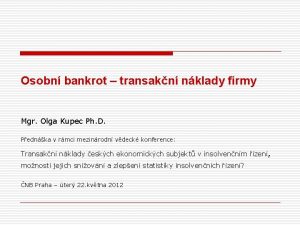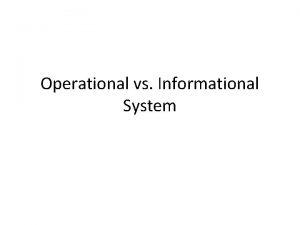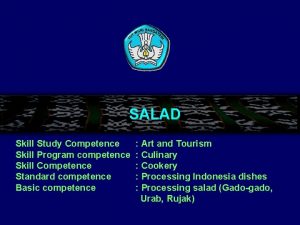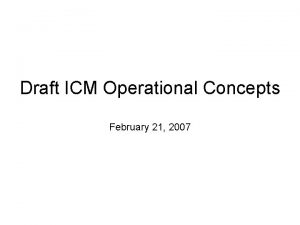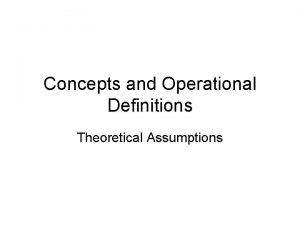Skill shortages Olga StrietskaIlina Operational concepts Skill shortages

















- Slides: 17

Skill shortages Olga Strietska-Ilina

Operational concepts Skill shortages - an overarching term, stands for quantitative and qualitative shortages. ¡ Labour shortage - quantitative lack of labour; e. g. shortage occupations. ¡ Skills gap - qualitative characteristic. ¡ Recruitment difficulties - an umbrella term. ¡

Information on skill shortages in the EU At national level: ¡ reach, ¡ conceptually and methodologically useful, ¡ non-comparable. At European level: ¡ reviews of methods and approaches, ¡ sector-based studies, ¡ no major survey or forecast with comparable results, ¡ EEO 2001 attempt, ¡ current Skillsnet activities, ¡ absence of reliable and comparable vacancy statistics.

Methods of measuring skill shortages Various qualitative and (semi-)quantitative approaches: ¡ ¡ ¡ enterprise surveys (regular or ad-hoc); analyses of advertisements, mid/long-term forecasting (supply-demand mismatch by occupation and type/level of education), measurement of adjustment behaviour at company level (self-observed or external), analysis of trends, comparisons, benchmarking. Static/dynamic; short-term/long-term. Most complex approaches combine methods.

Reasons for skill shortages ¡ ¡ Labour market tightness - small labour reserve; Economic, social and institutional conditions; Skills mismatch; Deficiency in recruitment practices, work organisation, wage policies and working conditions (not always directly linked to skill shortages). Combination and interplay of different factors.

Major conceptual issues ¡ Why the market does not solve the problem of skill shortages by market mechanisms? ¡ Where is the borderline between labour shortage and skills gap? ¡ Skill shortages and technological change and innovation: l Crowding out of the low-skilled from the labour market: does the tendency imply the changing character of occupations or overqualification? l Simplification or complexity of individual tasks? l Competitive business and product strategies and the demand for skills: high-wage skill intensive vs. lowwage/low-skill - equilibrium or trap? l Polarisation of jobs: Are intermediary occupations becoming casualties of technological change, or does the nature of the demand change and qualifications matter less?

Employment change by occupation in EU-25 in 2000 -2005 (thous. )

Unemployment change by occupation of previous employment in EU-25 and EU-15 in 2000 -2005 (thous. )

Employment change by sector (NACE) in EU-25 in 2000 -2005 (thous. )

Employment by occupation and highest level of education attained (change 2000 -2005 in thous. ) in EU-25

Employment by age groups and economic activity (%, LFS Spring 2006)

Employment by age groups and occupation (%, LFS Spring 2006)

Labour shortages ¡ ¡ Not yet understood as a European problem. Repeating occupations: l l l l l ¡ healthcare professions (doctors, nurses, care for old/disabled people); ICT specialists, managers, marketing specialists, financial analysts, scientists, engineers (mechanical, electrical, chemical), teachers, construction workers, carpenters, bricklayers, welders, electricians, heating and ventilation technicians, hotel and catering professions (e. g. cooks, waiters), truck drivers, sales representatives, cleaners, childminders etc. Demographic challenge, labour shortages and within EU labour migration: cure or temporary treatment?

Which skills? ¡ ¡ ¡ Technical skills specific to occupation/sector. Others skill gaps - similar across sectors and countries: l ICT skills, l foreign languages, l team working, l interpersonal communication, l initiative, creativity, l entrepreneurship, l leadership and management, l presentation skills, l ability to learn, etc. Personal characteristics: flexibility, motivation, loyalty, commitment, self-presentation (psychological, emotional and physical).

Changing meaning of skills and changing skill demand ¡ ¡ ¡ Social and personal skills matter more than formal qualifications, technical and theoretical knowledge; Companies recruit attitudes rather than competences. Should E&T primarily focus on these requirements? Are these skills trainable? Is there deterioration of the role of initial education in the life of individuals?

Adverse consequences of skill shortages ¡ ¡ ¡ At company level: higher wages, growing investment costs into current personnel, higher recruitment costs, lower productivity, lower quality, market losses, greater workload and pressure on the current personnel, lower competitiveness; A higher concentration of skill shortages at regional / national levels may deteriorate the overall competitiveness of the region/economy; Threat to investments in and development of knowledge-intensive and innovative industries (withdrawal to new markets outside the EU).

Recommendations ¡ ¡ Improve the knowledge base on skill shortages in Europe: comparable vacancy statistics; comparable enterprise surveys; pan-European forecasting. Further research into changing nature of the demand for skills and consequences for E&T. European-wide problems need European level solutions: e. g. common migration policy approach. Recognition that not all skill-shortage problems can be solved by the supply of skills (wage policy, social policy, employment protection, institutional efficiency, general market strategies).
 Inventory model with planned shortages
Inventory model with planned shortages Supply chain shortages are
Supply chain shortages are Shortage vs scarcity
Shortage vs scarcity स्किल क्या है
स्किल क्या है Movement concepts wheel
Movement concepts wheel Olga chernykh
Olga chernykh Olga kałużyńska psychiatra
Olga kałużyńska psychiatra Zjawisko venturiego
Zjawisko venturiego Olga luca
Olga luca Nyhistorisme
Nyhistorisme Olga volkotrub
Olga volkotrub Olga lucia giraldo
Olga lucia giraldo Olga cataraga
Olga cataraga Usent message olga
Usent message olga Enac ente nazionale canossiano
Enac ente nazionale canossiano Liternet co to jest
Liternet co to jest Olga kuzminova
Olga kuzminova Olga kupec
Olga kupec
